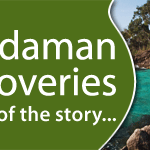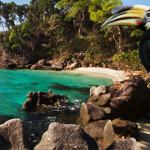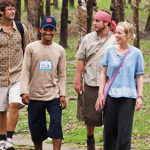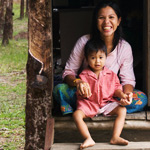Andaman Discoveries Blog
Wednesday, July 1, 2009
Community-Based Tourism Pilot Tour: The Real Value of a Home
It’s hard to explain what makes a home inviting and exude warmth. Is it the comfy sofa, the pictures on the wall, or a manicured lawn?
I believe that people create the feel of a place (okay, so architecture is a big player too, but if you fill the most beautiful building in the world with grumps, it’s not going to be a fun place).
Have you ever walked into a work place, and felt tension so thick, you could cut it with a knife? No one is talking, but yet you feel the emotion of the people.
| Ban Lion Village |
Ban Lion showed me what makes a place. The people, with genuine warmth in their eyes, a smile and the kindness to share their lives made their residences inviting, not the homes lined up like an Excel spreadsheet.
Our destination for a two-day pilot tour in June was Ban Lion, a village located on the northwest side of Koh Prathong in Phang Nga Province. The residents are a collective of people from different villages who were affected by the tsunami in 2004. The homes in the village were built with the support of Lions Club International.
We were greeted while unloading from the boat. I was instantly impressed that the villagers came to us, versus waiting for us to come to them.
The home style in Ban Lion likely contrasts the image of Thai homes most foreigners have in their heads. My first thought upon arrival was, “Am I in an American suburb?” Completely identical homes are in clean, distinct lines.
Any confusion I had was replaced and trumped ten-fold by the people. They were so determined to make us feel at home. Our homestay hosts were two, 20-year-old girls, who work at the nearby Golden Buddha Beach Resort.
The first day we explored sea grass at low tide where pools were full of more star fish than I’d ever seen at once. We visited the old village, called Pak Jok. The tsunami devastated Pak Jok Village, leaving only small sections of concrete road and the bases of a few buildings. From there, we walked to the beach for sunset.
| Sun Dew Plant |
On day two, we took a short tractor ride to the golden grass fields. Our energetic guides’ passion for the area was contagious. They took special care to point out each detail. My favorite plant was the sun dew, which has a trap for insects to fall into to provide the plant with nutrients.
There was a brief discussion at the end of the tour where we gave our feedback on everything from the food to activities. My overall feedback was that it’s the seemingly small stuff that makes a tour, a restaurant, a hotel or the world work. Life is all about the difference between someone pointing down the street, when you’re new in town and ask where post office is, versus someone walking you there and buying you a cup of coffee.
-Leslie Welshimer
Labels: community tourism, homestay, Thai culture, Thailand, Thailand homestay
Wednesday, March 18, 2009
Homestay with Andaman Discoveries
Reposted from the Briefcase to BACKPACK Blog
December 9, 2008 by Michaela Potter
Michael and I traveled to Thailand as part of our 2007 career break. The following is an excerpt from our travel blog.
 Of all the places we would visit on this trip, the last place I thought Michael would be able to relate to the most was a small Muslim Village in Thailand. But surprisingly, he eased right into sleeping on a mattress on a floor under mosquito netting with roosters crowing at 2am, speaking a completely different language from anyone else around us, and feeding baby goats twice a day. But he easily compared it to consulting -- traveling endlessly from one hotel to the next, needing to learn a new dialect or corporate speak, and understanding a new corporate environment and supporting it. Makes perfect sense.
Of all the places we would visit on this trip, the last place I thought Michael would be able to relate to the most was a small Muslim Village in Thailand. But surprisingly, he eased right into sleeping on a mattress on a floor under mosquito netting with roosters crowing at 2am, speaking a completely different language from anyone else around us, and feeding baby goats twice a day. But he easily compared it to consulting -- traveling endlessly from one hotel to the next, needing to learn a new dialect or corporate speak, and understanding a new corporate environment and supporting it. Makes perfect sense.Our stay in Tung Nang Dam was thanks to Andaman Discoveries -- an offshoot of the North Andaman Tsunami Relief (NATR) organization. As their website states “we started by doing relief projects FOR community members, then we progressed to development projects WITH community members, now we are assisting with projects led BY community members.”
 We were to stay four days/three nights in this small Muslim village, which consisted of just 35 homes and a population of 115. Even though Tung Nang Dam is protected by mangroves, (hence you can only access it by boat), and no homes or lives were lost during the tsunami, the fishermen lost their boats and livelihood and many fish farms were damaged beyond repair. And as part of the evolution of NATR “villagers decided that community-based tourism would allow them to generate additional income and support the community of their traditions, culture and lifestyle. Community-based tourism could fit into their lives, and not force them to sacrifice their traditional lifestyles for the sake of tourists.”
We were to stay four days/three nights in this small Muslim village, which consisted of just 35 homes and a population of 115. Even though Tung Nang Dam is protected by mangroves, (hence you can only access it by boat), and no homes or lives were lost during the tsunami, the fishermen lost their boats and livelihood and many fish farms were damaged beyond repair. And as part of the evolution of NATR “villagers decided that community-based tourism would allow them to generate additional income and support the community of their traditions, culture and lifestyle. Community-based tourism could fit into their lives, and not force them to sacrifice their traditional lifestyles for the sake of tourists.”Our host, P’Noi, and her family were the perfect hosts for this experience. P’Noi was part of the NATR seven-month vocational training program that focused on using tourism as a tool for community development; cultural, environmental and adventure-based guiding methods; first aid and safety training; English language and computer skills; small business management and entrepreneurial training; and hospitality and travel planning skills.
 One of P’Noi’s projects was an orchid conservation farm. Orchids in Tung Nang Dam are becoming increasingly rare, as they are popular decorations for homes and restaurants. Over-harvesting by mainland people has become a big problem in the jungles of the village. P’Noi has developed a program of incubating orchid cuttings on her farm and transplanting them to the jungle once they are mature. In addition, volunteers add their names, hometowns and date of planting on a plaque next to the orchid in hopes of dissuading people from cutting them. We did our part by planting cuttings in coconut planters with hopes of them returning to the jungle in the future. We also went on a jungle trek to fertilize those orchids that have been returned.
One of P’Noi’s projects was an orchid conservation farm. Orchids in Tung Nang Dam are becoming increasingly rare, as they are popular decorations for homes and restaurants. Over-harvesting by mainland people has become a big problem in the jungles of the village. P’Noi has developed a program of incubating orchid cuttings on her farm and transplanting them to the jungle once they are mature. In addition, volunteers add their names, hometowns and date of planting on a plaque next to the orchid in hopes of dissuading people from cutting them. We did our part by planting cuttings in coconut planters with hopes of them returning to the jungle in the future. We also went on a jungle trek to fertilize those orchids that have been returned.P’Noi and her family also had a goat farm, so every afternoon we would help shepherd them into their homes for the night as well as feeding the baby goats by bottle. Michael quickly took to this chore and had a few favorite kids that would nip at his feet for more. Another cultural activity that P’Noi shared with us was cooking. She shared with us how to make the Thai equivalent of a small pancake, guided us in cooking a seafood lunch, and even grilled oysters on a fire with her brothers.
 Of course the activities were just a side to the actual experience of living within a completely different environment, learning to communicate in broken Thai and sign language, and placing ourselves out of our comfort zone. But as much as we struggled in this new environment, the fact that these people, who come from a very shy culture and have to learn much more in order to accommodate us, opened up their homes and lives to us was extremely humbling.
Of course the activities were just a side to the actual experience of living within a completely different environment, learning to communicate in broken Thai and sign language, and placing ourselves out of our comfort zone. But as much as we struggled in this new environment, the fact that these people, who come from a very shy culture and have to learn much more in order to accommodate us, opened up their homes and lives to us was extremely humbling.Labels: Thai culture, Thailand homestay, Tung Nang Dam, Village Tours
Thursday, March 12, 2009
Muang Kluang Village
Andaman Discoveries introduces new destination
 Andaman Discoveries began working with Muang Kluang village last year as part of our effort to further diversify our award-winning village tours and homestay program. We're now ready to invite guests to spend time in this unique village. Working with Muang Kluang accomplishes two goals: expanding our support network of communities in the north Andaman area and offering more cultural activities for our visitors.
Andaman Discoveries began working with Muang Kluang village last year as part of our effort to further diversify our award-winning village tours and homestay program. We're now ready to invite guests to spend time in this unique village. Working with Muang Kluang accomplishes two goals: expanding our support network of communities in the north Andaman area and offering more cultural activities for our visitors.Andaman Discoveries invested extensive research into Muang Kluang by personally visiting the homestays, participating in village activities, and talking in-depth with homestay group coordinator Khun Jo Jo . We're confident that Andaman Discoveries’ guests will thoroughly enjoy spending time in Muang Kluang as well. The program will benefit the villagers through revenue generation that will go towards skills development and youth education.
In 2007, Muang Kluang received the accolade of “The Most Outstanding Community-based Tourism Award” by the Tourism Authority of Thailand. Andaman Discoveries is excited to offer this additional destination for guests seeking an authentic cultural experience. Please contact us for more information.
Labels: Muang Kluang, Thai culture, Thailand homestay, Village Tours
Subscribe to Posts [Atom]






